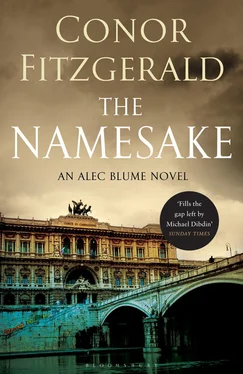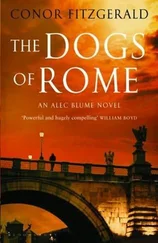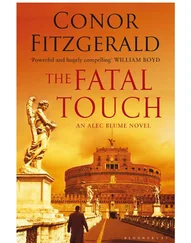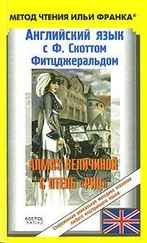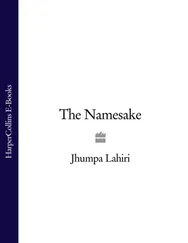Conor Fitzgerald - The Namesake
Здесь есть возможность читать онлайн «Conor Fitzgerald - The Namesake» весь текст электронной книги совершенно бесплатно (целиком полную версию без сокращений). В некоторых случаях можно слушать аудио, скачать через торрент в формате fb2 и присутствует краткое содержание. Жанр: Полицейский детектив, на английском языке. Описание произведения, (предисловие) а так же отзывы посетителей доступны на портале библиотеки ЛибКат.
- Название:The Namesake
- Автор:
- Жанр:
- Год:неизвестен
- ISBN:нет данных
- Рейтинг книги:3 / 5. Голосов: 1
-
Избранное:Добавить в избранное
- Отзывы:
-
Ваша оценка:
- 60
- 1
- 2
- 3
- 4
- 5
The Namesake: краткое содержание, описание и аннотация
Предлагаем к чтению аннотацию, описание, краткое содержание или предисловие (зависит от того, что написал сам автор книги «The Namesake»). Если вы не нашли необходимую информацию о книге — напишите в комментариях, мы постараемся отыскать её.
The Namesake — читать онлайн бесплатно полную книгу (весь текст) целиком
Ниже представлен текст книги, разбитый по страницам. Система сохранения места последней прочитанной страницы, позволяет с удобством читать онлайн бесплатно книгу «The Namesake», без необходимости каждый раз заново искать на чём Вы остановились. Поставьте закладку, и сможете в любой момент перейти на страницу, на которой закончили чтение.
Интервал:
Закладка:
Ruggiero rightly considered this a rhetorical question and said nothing.
‘Threats and restrictions are what make us strong. Threats above all, provided they are external and not internal. Outside enemies make us strong. Restrictions and obedience also make us strong. Someday, it may be good to find yourself facing a powerful enemy, especially one who thinks he knows your weaknesses. And you will have a weakness. We all do.’
‘So how do you stop them from exploiting it?’
‘You change it at the last moment. The regular drunkard who turns up for a fight with his mind alert, focused and sober, the coward who puts his life on the line, the miser who throws away all his wealth to confound his enemy, the joker who turns deadly serious — these are the people who suddenly emerge victorious. But first you need to see where your weakness is. For this you need an enemy, because your enemy will always be nearer the truth in their opinion of you than you are yourself.’
‘What’s your weakness, Papa?’
‘Find out your own first before you ask me, and find it from someone who hates you.’
‘Is that how you found out yours?’
‘I had many weaknesses, but I have worked for years in a foreign and hostile land in the company of someone who hates me more with each passing day, and that has kept me alive, alert and strong.’
‘Are you talking about Enrico’s dad? I thought our families were close.’
‘We are. But let me tell you a story about Tony. In some ways, it is a story that redounds to his honour. I want you to know it so that you understand something of the character of the man. I also want you to imagine how it would feel to be the enemy of a man such as this. Are you following me?’
‘Yes.’
‘In 1963, a faction of the Society was still aligned with the Communist Party. This was because the party was not in government and was regarded as being a sort of anti-state. All the Society’s income came from providing business protection and seizing hostages, or kidnap victims as the press always called them, from the wealthy north for distribution to the people of our land. So the melandrini, the Ndrangheta gangs, were doing in deed what the Communists only promised. That year, a feud broke out between the Mazzaferro and Neri families over the control of the bergamot orange plantations of Reggio Calabria. The Mazzaferro represented an old version of the Society based on ideas of socialism and land reform. Not collectivization or real socialism, since there always have to be landlords and tenants, but they wanted more social justice. The Neri represented a new right-wing version of the Society. In those days, they were very interested in what was going on in Greece where the colonels had taken power. The Neri got mixed up with monarchists and fascists and princes of the Church, as well as magistrates, Christian Democrats, and even elements of the armed forces and police. It was a strange time of strange ideologies, none of which survived for long.
‘The feud between these two families would not usually involve people from our side of the country. But one family from our area, the Megales, with great strategic acumen, decided to offer assistance to the Neris. They sent an expeditionary force up the mountain to help them. So it was that one night in May 1964, a group led by Domenico Megale — you know of him now as Megale u Vecchiu because he is old, but then he was still in his prime, and everyone called him Mimmo instead of Domenico. They say he brought with him his son, then twelve years of age, to show the people of the town that even if his son was slow in his speech and thought, he was fast and merciless in his action. I’m not sure if that’s true.’
‘You mean Zio Pietro?’ Ruggiero tried to picture Enrico’s truculent and silent uncle as a boy, but couldn’t.
‘Yes, Zio Pietro. Now, where was I?’
‘Domenico Megale was leading an expeditionary group,’ said Ruggiero.
‘Right. Domenico Megale and his group breached the defences of the Mazzaferro fort, which was nothing more than a drystone house on the slopes of Aspromonte, and destroyed its inhabitants, wiping out an entire branch of the Mazzaferro. That night of slaughter ended the feud, and relegated that branch of the Mazzaferro family, or what was left of it, to obscurity.’
‘But the Mazzaferro are still in charge in Gioioso Ionico.’
‘Different clan, same surname. Don’t interrupt,’ said his father. ‘When Megale and the Neri squad left, there were twelve males and eight females left dead, their ages ranging from seven to seventy-seven. Four more were seriously injured, three of them maimed for life, and if you look you may well see one of them, disfigured of body, who remains among us yet, pardoned and reinstated by Basile himself.’
‘Was Basile involved in any of this?’
‘Basile was the deal-maker and peacekeeper. He did not take sides, which is his speciality. He never takes sides until the dust settles, and is always ready to mediate. Basile’s only interest is this area, and now he has this gelateria… You interrupted me again.’
‘Sorry.’
‘That’s OK. It means you’re listening. Some of the very oldest were left alive, to bury their dead and bear witness. A beautiful young mother, whose husband was away at the time, was also allowed to live. But perhaps it was better she had died, for her child of one year, her only son, disappeared during that night of slaughter. After the feud was declared officially closed, the woman’s husband, who lived in northern exile, like so many of us, was allowed to return. He was supposed to comfort his wife and give her new sons to help her overcome her grief, but this never happened. The body of the child was never returned. It was given to understand that a picciotto who had snatched the abandoned child from his cradle as the mother cowered in the next room lost his life soon after the end of the feud.
‘Some said that it had not been a lowly picciotto but the chief sgarrista himself, Domenico Megale, who was in that room. And some also said that he had held the infant in his hands, ready to dash its head against the wall, but overcome by sudden compassion, had spared the child’s life. But Domenico Megale never spoke of it, and no one dared to ask him, and the memory of the bloody night began to fade.
‘The young mother never had another child, and for years she never mentioned what happened that night. In 1982, when I was a young man hardly older than you, the mother had a vision. Her child, now a young man of nineteen years, she claimed had appeared to her in a dream, accompanied by the Blessed Gioacchino da Fiore dressed in rags.
‘Most people felt great sympathy for the woman, who was now leaving child-bearing age behind her. People said her dream had been sent as a message of farewell to her youth and fertility. As it was evidently her grief that was speaking to her, she was treated with the utmost kindness by the town. But their patience was soon exhausted as she continued in her delusions. As the years passed, she continued to report that her son, now aged twenty, now twenty-one, and now twenty-five, was visiting her while she slept, sometimes accompanied by the Madonna, sometimes by Padre Pio but more often by the Blessed Gioacchino da Fiore. She began to make pilgrimages to the town of San Giovanni in Fiore to visit the Abbey of Florens, and when her story became known, the monks there did what they could to console her and pray for her, even holding a special mass one night in November.
‘Then, in 1989, she did the unthinkable and went to the Carabinieri and denounced Megale for the events of a quarter of a century earlier. She did so at five o’clock in the evening, walking straight up to the barracks under the eyes of the whole town.’
Читать дальшеИнтервал:
Закладка:
Похожие книги на «The Namesake»
Представляем Вашему вниманию похожие книги на «The Namesake» списком для выбора. Мы отобрали схожую по названию и смыслу литературу в надежде предоставить читателям больше вариантов отыскать новые, интересные, ещё непрочитанные произведения.
Обсуждение, отзывы о книге «The Namesake» и просто собственные мнения читателей. Оставьте ваши комментарии, напишите, что Вы думаете о произведении, его смысле или главных героях. Укажите что конкретно понравилось, а что нет, и почему Вы так считаете.
